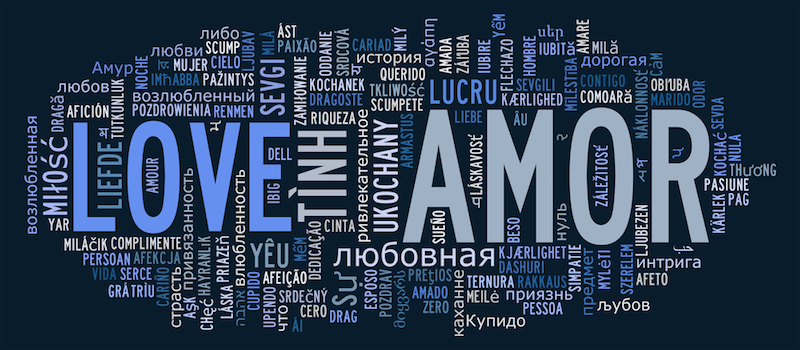Happy Words Dominate Most Languages

From the idealistic prose of Cervantes' "Don Quixote" to the crisis-ridden pages of daily newspapers, most human language tends to take a happy view on life, a new study suggests.
A team of scientists used Big Data techniques to examine a massive amount of data on 10 languages, from Korean Twitter feeds to Russian literature, and found that the most commonly used words in each language were all skewed toward the positive.
This positive bias in language "is not what people think when they read the paper or listen to music on the radio or read YouTube comments," said Christopher Danforth, an applied mathematician at the University of Vermont and co-author of the study. The research was published yesterday (Feb. 9) in the journal Proceedings of the National Academy of Sciences. [Biased Toward Happiness? (Infographic)]
After analyzing the language data, Danforth and his team went on to develop an interactive "happiness meter" to measure people's emotions on the social media site Twitter, and compare them in different parts of the country.
The new research draws on some old ideas about language. "The concept has been around for a while that maybe we are hard-wired to communicate in a way that encourages us to get along," Danforth told Live Science.
The happiness bias
In 1969, psychologists at the University of Illinois came up with the idea, dubbed the Pollyanna hypothesis, that humans have a universal tendency to use positive words more often than negative ones. But those findings were based on small studies.
Sign up for the Live Science daily newsletter now
Get the world’s most fascinating discoveries delivered straight to your inbox.
In the new study, Danforth and his team took a more data-driven approach. The researchers analyzed billions of words from English, Spanish, French, German, Brazilian Portuguese, Korean, Chinese (Simplified), Russian, Indonesian and Arabic. The words came from two dozen types of sources, such as books, news outlets, social media, websites, television and movie subtitles, and music lyrics.
The researchers identified about 10,000 of the most commonly used words for each language, and asked native speakers to rate the happiness of these words on a scale from 1 to 9, where 9 was a smiling face, 1 was a frowning face, and 5 was neutral. For example, English speakers rated the word "laughter" at 8.50 and the word "terrorist" at 1.30.
On average, the ratings showed that a Google search of Spanish websites had the highest score for word happiness, followed by Portuguese Google searches, Portuguese Tweets, and English Google Books. Chinese Google Books had the least happy words, followed by Korean movie subtitles and English music lyrics. But across all languages and types of text, the median word happiness score was higher than 5 on the scale of 1 to 9. In other words, humans use more happy words than sad ones, the researchers said.
Happiness meter
In addition to the ranking experiment, the researchers created an online word "happiness meter," called a hedonometer, which can track posts on Twitter in real-time. The meter showed dips in happiness during tragedies such as the Charlie Hebdo terrorist attack in Paris, and spikes in positivity on holidays like Christmas and New Year's Day.
Another cool feature of the tool is the ability to chart the ebb and flow of happiness over the course of a book. For example, the hedonometer score of words in Herman Melville's "Moby Dick" dips down at its dark ending, whereas Alexandre Dumas' "The Count of Monte Cristo" ends with a high happiness score.
The hedonometer can also be used to track happiness in different parts of the country. For example, Vermont and Boulder, Colorado, currently rank as the happiest U.S. state and city, respectively, whereas Louisiana and Racine, Wisconsin, rank as the saddest, the researchers said.
Such a tool could be useful for journalists or policy experts, who might use it to gauge public opinion on different events, Danforth said. While the hedonometer can't always substitute for traditional survey data, he said, "it's just one of the dials on the dashboard [President] Obama would want to see every day."
Follow Tanya Lewis on Twitter. Follow us @livescience, Facebook & Google+. Original article on Live Science.










